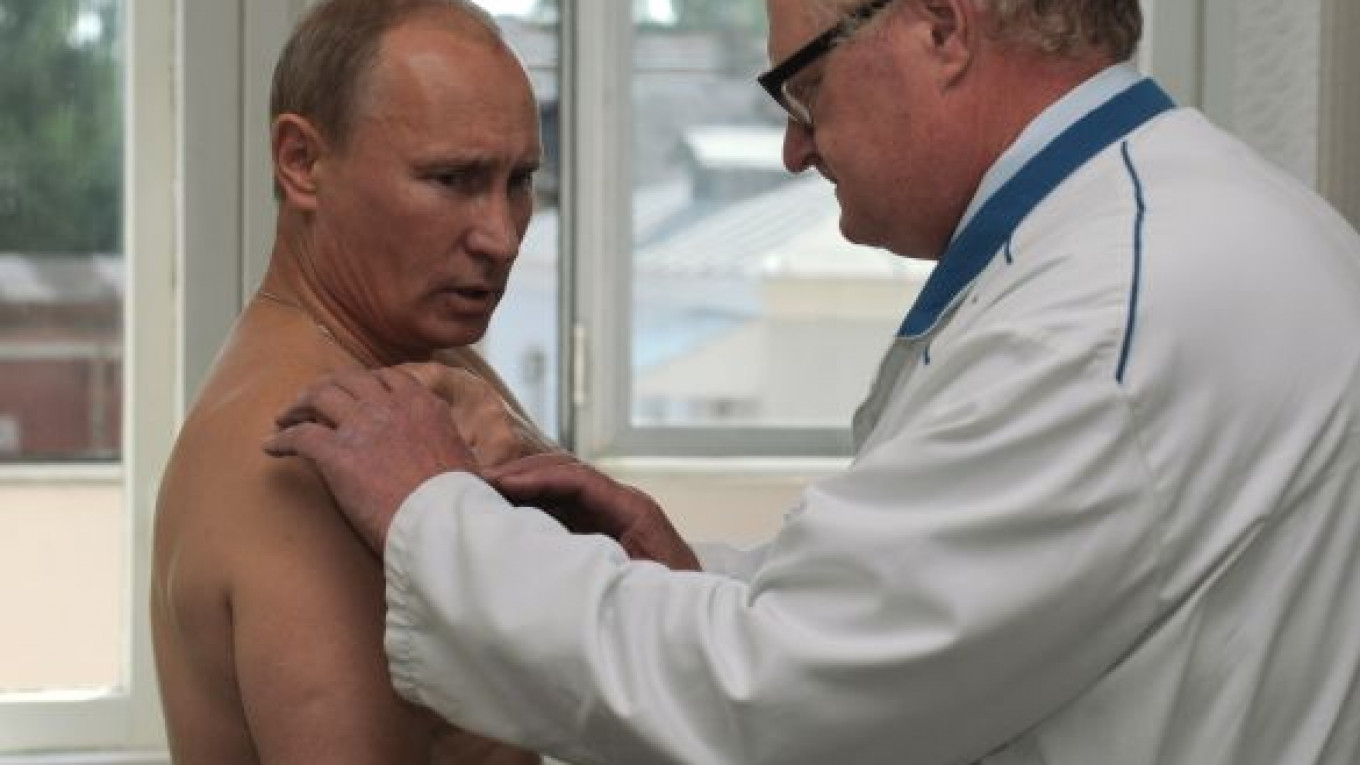SMOLENSK — Prime Minister Vladimir Putin lashed out at regional authorities Thursday for failing to put 460 billion rubles ($15 billion) earmarked for health care modernization to good use.
Seeking to stress the need for proper health care, he went for a medical checkup himself, undressing to the waist at a doctor's request before the cameras.
"Some hi-tech centers make successful organ transplants, like heart transplantations," he said at a government meeting on health care in Smolensk. "I feel like someone must have his head transplanted."
Saratov region authorities, in particular, came under fire for missing a deadline to build a modern center for prenatal care — new entities in the health system specializing in caring for pregnant women.
Local officials reported commissioning the building last December, only to push the deadline back to May and then to next December, Putin said, adding that similar problems appear in other regions, including Perm, Chita and Kurgan.
"What's this? What kind of approach to business is it?" Putin fumed before the cameras. "We can't say there's a shortage of money. The money has been provided."
A number of regions — Belgorod, Lipetsk and Bryansk — are successfully pushing ahead with the health care modernization program, he conceded.
The federal government spent 19 billion rubles on the construction of prenatal centers between 2008 and 2010, in addition to another 15 billion rubles provided by the regions, Putin said. There are 17 such centers in operation nationwide, and another seven are to be built, he said.
In Saratov's case, governor Pavel Ipatov pinned the blame during the Thursday meeting on the developer, who he said missed the construction deadlines.
Ipatov added, perhaps unwisely, that utility lines are currently being connected to the building, which prompted Putin to inquire how the center could have been brought on line last winter if there were no utilities there. The governor promised to complete the project by the end of this year.
Putin also called for governors to control how federal budget funds set aside for modernizing the health care system are used.
In the Central Federal District, only 4.7 billion rubles, or 13 percent of funds set aside for new medical equipment and repairing hospitals have actually been used so far, he said.
"The federal districts have received funding, and now everything depends on the regions' initiative, on their ability to organize work the right way," Putin said. "There's no time to drag their feet."
"Though all of them are in equal conditions, we have to acknowledge that the results are different," he said, adding that, "funds must be spent on buying modern equipment through transparent procedures."
During his visit to Smolensk, Putin toured a local hospital, which is still being renovated under the modernization program.
He also went for a medical checkup, undressing to complain about a shoulder sprain he received during a morning exercise session.
"My shoulder hurts, can you check it?" he complained, Interfax reported. A doctor gave him an "anesthetic application" and recommended an ointment, the report said.
A Message from The Moscow Times:
Dear readers,
We are facing unprecedented challenges. Russia's Prosecutor General's Office has designated The Moscow Times as an "undesirable" organization, criminalizing our work and putting our staff at risk of prosecution. This follows our earlier unjust labeling as a "foreign agent."
These actions are direct attempts to silence independent journalism in Russia. The authorities claim our work "discredits the decisions of the Russian leadership." We see things differently: we strive to provide accurate, unbiased reporting on Russia.
We, the journalists of The Moscow Times, refuse to be silenced. But to continue our work, we need your help.
Your support, no matter how small, makes a world of difference. If you can, please support us monthly starting from just $2. It's quick to set up, and every contribution makes a significant impact.
By supporting The Moscow Times, you're defending open, independent journalism in the face of repression. Thank you for standing with us.
Remind me later.






